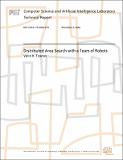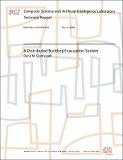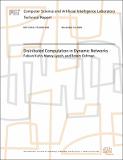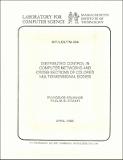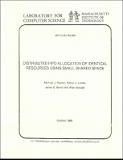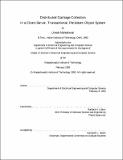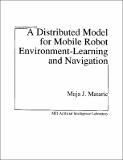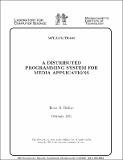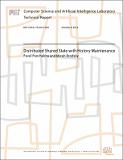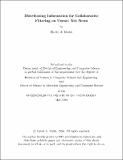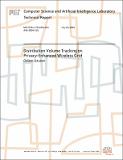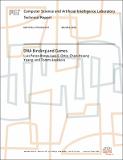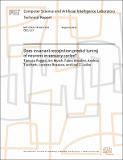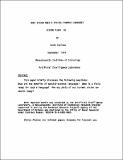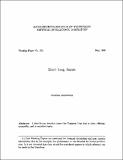Browsing Computer Science and Artificial Intelligence Lab (CSAIL) by Title
Now showing items 970-989 of 3804
-
Distributed Area Search with a Team of Robots
(2006-12-05)The main goal of this thesis is to demonstrate the applicability of the distributed systems paradigm to robotic systems. This goal is accomplished by presenting two solutions to the Distributed Area Search problem: organizing ... -
A Distributed Building Evacuation System
(2008-07-14)This thesis investigates the feasibility of a smart building evacuation system, capable of guiding occupants along safe paths to exits and responding to changing threats. Inspired by developments in amorphous computing, ... -
Distributed Computation in Dynamic Networks
(2009-11-10)In this report we investigate distributed computation in dynamic networks in which the network topology changes from round to round. We consider a worst-case model in which the communication links for each round are chosen ... -
Distributed Computer Systems: Structure and Semantics
(1979-04)This report describes an ongoing project in the area of design of distributed systems. The goal is to develop an effective programming system that will support well-structured design implementation, maintenance and control ... -
Distributed Control in Computer Networks and Cross-sections of Colored Multidimensional Bodies
(1986-04)The number of messages to match a pair of processes in a multiprocessor network with mobile processes is a measure for the cost of setting up temporary communication between processes. We establish lower bounds on the ... -
A Distributed Data-balanced Dictionary Based on the B-link tree
(1992-02)Many concurrent dictionary data structures have been proposed, but usually in the context of shared memory multiprocessors. In this paper, we present an algorithm for a concurrent distributed B-tree that can be implemented ... -
Distributed FIFO Allocation of Identical Resources Using Small Shared Space
(1985-10)We present a simple and efficient algorithm for the FIFO allocation of k identical resources among asynchronous processes which communicate via shared memory. The algorithm simulates a shared queue but uses exponentially ... -
Distributed Garbage Collection in a Client-server, Transaction, Persistent Object System
(1993-08)We present a design for distributed garbage collection in a object-oriented database system called Thor. Garbage collection in Thor is different from that in conventional distributed systems because Thor has a client-server ... -
Distributed Method Selection and Dispatching of Contingent, Temporally Flexible Plans
(2007-03-05)Many applications of autonomous agents require groups to work in tight coordination. To be dependable, these groups must plan, carry out and adapt their activities in a way that is robust to failure and to uncertainty. ... -
A Distributed Model for Mobile Robot Environment-Learning and Navigation
(1990-05-01)A distributed method for mobile robot navigation, spatial learning, and path planning is presented. It is implemented on a sonar-based physical robot, Toto, consisting of three competence layers: 1) Low-level navigation: ... -
Distributed Name Management
(1985-02)The problem being addressed in this research is the design of a naming facility achieving the following goals. First, two functions on names must be supported: accessing a named object, and acting as a place holder for ... -
Distributed Shared State with History Maintenance
(2013-10-08)Shared mutable state is challenging to maintain in a distributed environment. We develop a technique, based on the Operational Transform, that guides independent agents into producing consistent states through inconsistent ... -
Distributing Information for Collaborative Filtering on Usenet Net News
(1994-05)As part of the Information Revolution," the amount of raw information available to computer users has increased as never before. Unfortunately , there has been a corresponding jump in the amount of unrelated information ... -
Distribution Volume Tracking on Privacy-Enhanced Wireless Grid
(2004-07-25)In this paper, we discuss a wireless grid in which users are highly mobile, and form ad-hoc and sometimes short-lived connections with other devices. As they roam through networks, the users may choose to employ ... -
Diversity-based Inference of Finite Automata
(1988-05)We present a new procedure for inferring the structure of a finite-state automaton (FSA) from its input/output behavior, using access to the automaton to perform experiments. Our procedure uses a new representation for ... -
DNA Binding and Games
(2006-03-06)We propose a game-theoretic approach tolearn and predict coordinate binding of multiple DNA bindingregulators. The framework implements resource constrainedallocation of proteins to local neighborhoods as well as to ... -
Does invariant recognition predict tuning of neurons in sensory cortex?
(2013-08-06)Tuning properties of simple cells in cortical V1 can be described in terms of a "universal shape" characterized by parameter values which hold across different species. This puzzling set of findings begs for a general ... -
Does Vision Need a Special-purpose Language?
(MIT Artificial Intelligence Laboratory, 1973-09)This paper briefly discusses the following questions: What are the benefits of special-purpose languages? When is a field ready for such a language? Are any parts of our current vision research ready? -
Don't Loop, Iterate
(MIT Artificial Intelligence Laboratory, 1990-05)I describe an iteration macro for Common Lisp that is clear, efficient, extensible, and in excellent taste.

